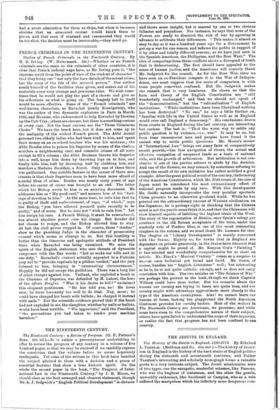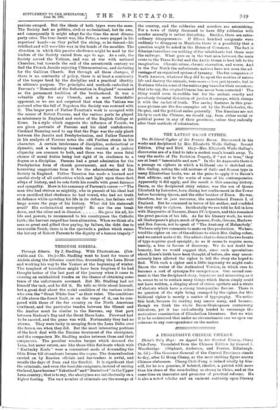THE JESUITS IN ENGLAND.
The History of the Jesuits in England, 1580-1771 By Ethelred L. Taunton. (Methuen and Co. 21s. net.)—The history of Jesuit- ism in England is the history of the back-stairs of English politics during the sixteenth and seventeenth centuries, and Father Taunton's interesting and scholarly monograph forms a valuable guide to a very intricate subject. The Jesuit missionaries were of two types, one the energetic, masterful schemer, like Parsons, who was the bugbear of statesmen, and the other the gentle, unworldly enthusiast, like Southwell or Campion, who as a rule suffered the martyrdom which his infinitely more dangerous coin-
panions escaped. But the ideals of both types were the same. The Society had no politics, civil or ecclesiastical, but its own, and consequently it might adopt for the time the most diverse party cries. The true Jesuit was, like Petre, a mere puppet in his superiors' hands—as they pulled the string, so he danced—his intellect and will were like wax in the hands of the moulder. The direction in which this passive obedience might be used by the leaders of the Society varied from age to age. As a rule, the Society served the Vatican, and was at war with national Churches, but towards the end of the seventeenth century we find the French Jesuits rejecting Ultramontanism, and declaring for the Galilean Church. But through all these changes, if there is no continuity of policy, there is at least a continuity of the temper bred by the discipline and a practical identity in ultimate purpose. The principles and methods embodied in Parsons's "Memorial of the Reformation in England" remained as the permanent tradition of the brotherhood. It was a valuable ally for any Church, and a most formidable opponent, so we are not surprised that when the Vatican was restored after the fall of Napoleon the Society was restored with it. The larger part of Father Taunton's work is occupied with the career of Robert Parsons, and the various parts he played as missionary in England and rector of the English College at Rome. In a style which suggests the influence of Froude, we are given portraits of Parsons and his chief confederates. Cardinal Manning used to say that the Pope was the only plank between the Jesuits and Presbyterianism, and Father Taunton in his analysis of Parsons notes the odd Puritan strain in his character. A certain intolerance of discipline, ecclesiastical or dynastic, and a tendency towards the creation of a jealous oligarchy are common to both, and there was the same fatal chance of moral duties being lost sight of in obedience to a dogma or a discipline. Parsons had a great admiration for the Presbyterian form of church government, and we find him borrowing suggestions from it for the administration of the Society in England. Father Taunton has made a learned and careful study of all authorities which cast light upon these dark alleys of history, and he seta forth his results with great fairness and sympathy. Here is his summary of Persona's career :—" The man who had striven so mightily, who in pursuit of his ideal had even sacrificed that obedience he had vowed, who had set truth at defiance while spending his life in its defence, has failure writ large across the page of his history. What did his statecraft avail? His ecclesiastical monopoly? He saw the one break
down, and the other end in disaster He gave his all, his life and powers, to recommend to his countrymen the Catholic faith; the harvest reaped has been alienation. When we think of a man so great and gifted thus paying, by failure, the debt due to inexorable Truth, there is in the spectacle a pathos which raises the history of Robert Parsons to the dignity of a human tragedy."





















































 Previous page
Previous page